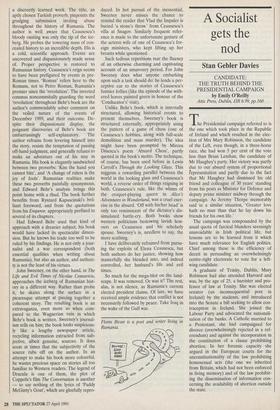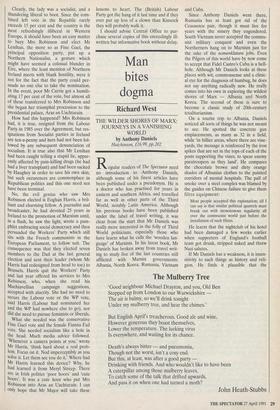A Socialist gets the nod
Stan Gebler Davies
CANDIDATE: THE TRUTH BEHIND THE PRESIDENTIAL CAMPAIGN by Emily O'Reilly Attic Press, Dublin, LIR 6.99, pp.160 The Presidential campaign referred to is the one which took place in the Republic of Ireland and which resulted in the elec- tion of Mrs Mary Robinson, the candidate of the Left, even though, in a three-horse race, she had won 5 per cent of the vote less than Brian Lenihan, the candidate of Mr Haughey's party. Her victory was partly due to our absurd system of proportional representation and partly due to the fact that Mr Haughey had dismissed his old friend and colleague of 30 years' standing from his posts as Minister for Defence and deputy prime minister midway through the campaign. As Jeremy Thorpe memorably said in a similar situation, 'Greater love hath no man than that he lay down his friends for his own life.'
The campaign was compounded by the usual quota of farcical blunders seemingly unavoidable in Irish political life, but lessons are to be learned from it which have much relevance for English politics. Chief among these is the efficiency of deceit in persuading an overwhelmingly centre-right electorate to vote for a left- wing candidate.
A graduate of Trinity, Dublin, Mary Robinson had also attended Harvard and was, by the age of 25, a barrister and pro- fessor of law at Trinity. She was elected senator (an inconsequential post in Ireland) by the students, and introduced into the Senate a bill seeking to allow con- traception in Ireland. She joined the Labour Party and advocated the nationali- sation of the banks. A Catholic married to a Protestant, she had campaigned for divorce (overwhelmingly rejected in a ref- erendum) and against the incorporation in the constitution of a clause prohibiting abortion. In her forensic capacity she argued in the European courts for the unconstitutionality of the law prohibiting homosexual acts (the one we inherited from Britain, which had not been enforced in living memory) and of the law prohibit- ing the dissemination of information con- cerning the availability of abortion outside the state. Clearly, the lady was a socialist, and a thundering liberal to boot. Since the com- bined left vote in the Republic rarely exceeds 15 per cent and the country is the most refreshingly illiberal in Western Europe, it should have been an easy matter to bury Mrs Robinson and elect Mr Lenihan, the more so as Fine Gael, the principal opposition party, put up a Northern Nationalist, a gesture which might have seemed a colossal blunder in Eire, where the least mention of Northern Ireland meets with blank hostility, were it not for the fact that the party could per- suade no one else to take the nomination. In the event, poor Mr Currie got a humili- ating 17 per cent of the vote, but almost all of these transferred to Mrs Robinson and she began her triumphal procession to the presidential palace, Aras an Uachtarain.
How had this happened? Mrs Robinson had, it is true, resigned from the Labour Party in 1985 over the Agreement, but res- ignations from Socialist parties in Ireland are ten-a-penny and hers had not been fol- lowed by any subsequent denunciation of socialism. It is true also that Mr Lenihan had been caught telling a stupid lie, appar- ently affected by pain-killing drugs (he had had a liver transplant) and had been sacked by Haughey in order to save his own skin, but such occurences are commonplace in Republican politics and this one need not have been terminal.
No, the evil genius who saw Mrs Robinson elected is Eoghan Harris, a bril- liant and charming fellow. A journalist and broadcaster, he had devoted 25 years in Ireland to the promotion of Marxism until, in a flash, he saw the light, wrote a pam- phlet embracing social democracy and then persuaded the Workers' Party which still sits with the French communists in the European Parliament, to follow suit. The consequence was that they elected seven members to the Dail at the last general election and sent their leader (whom Mr Harris had redesigned from head to toe) to Brussels. Harris quit the Workers' Party and last year offered his services to Mrs Robinson, who, when she read his Machiavellian campaign suggestions, accepted with alacrity. She had no need to secure the Labour vote or the WP vote, said Harris (Labour had nominated her and the WP had nowhere else to go), nor did she need to pursue feminists or liberals.
What she needed was the conservative Fine Gael vote and the female Fianna Fail vote. She needed socialism like a hole in the head. Much media advice followed. `Whenever a camera points at you,' wrote Mr Harris, 'think hard about a real prob- lem. Focus on it. Nod imperceptibly as you solve it. Let them see you do it.' Where had Mr Harris learned this device? Why, he had learned it from Meryl Streep. There are in Irish politics 'poor hoors' and 'cute boors'. It was a cute hoor who put Mrs Robinson into Aras an Uachtarain. I can only hope that Mr Major will take these lessons to heart. The (British) Labour Party got the hang of it last time and if they ever put up less of a clown than Kinnock they will probably walk it.
I should advise Central Office to pur- chase several copies of this exceedingly ill- written but informative book without delay.



















































 Previous page
Previous page